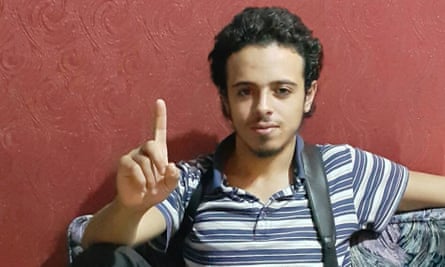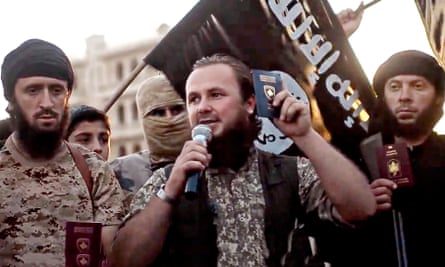Scrolling through photos on her mobile phone, Saliha Ben Ali stops at a picture of her son, Sabri, as a three-year-old sitting on Father Christmas’s lap. Santa’s white-gloved hands envelope Sabri’s small torso and that of the little boy sitting to his right. Both lads stare straight ahead, looking slightly bewildered. “To think, they were the only guys who were scared of Santa Claus that day,” Ben Ali recalls. “Now both of them are dead.”
Sabri died in Syria aged 19, fighting for Isis, sometime between August 2013 and 8 December that year, when an unknown man telephoned Ben Ali’s husband to tell them he had been killed. She is still haunted by the 10-second phone call in which the man said “congratulations, your son is a martyr”.
Bilal, the boy with whom Sabri shared Santa’s lap as a toddler and later went to school with him in Brussels, died in Paris on 13 November 2015. He was the jihadi who detonated a suicide bomb outside the Stade de France football stadium during the murderous night of attacks.
“I was stunned when Sabri did what he did,” Ben Ali says. “I saw the signs before he went that something was wrong, that he was being manipulated, but there was nobody to help me. Then when I saw what Bilal did, I simply could not believe it.”
Bilal’s mother, Fatima Hadfi, has described her 20-year-old son as having had the temperament of “a ticking timebomb” in the weeks before he blew himself up. But she was as unsure as Ben Ali as to where she might turn for help.
“The first she knew of what her son had done was when she saw his image on her television screen two days after the attack,” Ben Ali says.
The 44-year-old Belgian social worker – “even with a job like that I couldn’t save him”, she says – is sitting in a workshop on family-based intervention in Berlin, which is an introduction to her becoming a family counsellor to help others whose relatives have been drawn into the jihadi radicalisation process, to try to win them back.
“Deradicalisation is a very underestimated part of counter-terrorism,” says Daniel Köhler, who is running the course. One of just a handful of experts in the field anywhere in the world, he founded and directs the German Institute on Radicalisation and Deradicalisation Studies (Girds) in Berlin. “Family counselling is one of the most effective tools … nothing is a stronger source for creating a living counter-narrative to radical ideals than the deep attachments and emotions harnessed in a family. Even jihadi recruiters are unable to touch that.”
His pioneering approach, built on years of experience working on countering far-right extremism in Germany, is often described as a soft method. How favourably it is viewed by policymakers at any given time depends on current events, Köhler says. After high-profile attacks, such as those in Paris and Brussels, accusations abound that deradicalisation programmes do not work and governments and the public move towards more repressive measures, he explains. Köhler says there is no concrete way of measuring the success of his approach but he knows first-hand just how much call for the methods there is.

He recently helped establish a nationwide counselling programme in the Netherlands, and was struck by the demand there was for the network even before it was up and running. “Even as it was being set up, the team was dealing with very relevant high-security cases, there was just no time to waste,” he says.
Köhler describes his organisation as a bridge between families at risk and a whole network of social workers, teachers and security agencies, “a neutral, reliable agent that the family can contact at any time, that can give them the tools to recognise radicalisation and react to it, without feeling they’re in the role of snitches”. He says he will inform security services in high-risk cases, often when the family requests it, but believes prevention and intervention have a vital role to play in counter-terrorism.
At the workshop in a communist-era prefab in Berlin, Ben Ali shares her experiences with two other mothers.
Christianne Boudreau’s son Damian Clairmont, 22, left his native Canada for Syria to fight alongside Isis in late 2012. She heard of his death via Twitter in January 2014. Karolina Dam, a New Zealand-born Danish citizen, lost her 18-year-old son Lukas a year ago when he was killed in the Syrian border town of Kobani during a US-led coalition airstrike.
The women, who formed Mothers for Life, a network of mothers who have lost their children to jihadi battle groups, now counsel other families who want help to bring their relatives back from the brink, adamant that no other parent should go through what they have.
Köhler outlines the importance of taking a tailor-made approach to each case, invariably involving a young person who is in the process of being recruited by a jihadi group. He has repeatedly seen how such groups try to create conflict within a family of someone they are targeting.
He gives an example of a family he helped, where the son, a convert to Islam, was showing increasing signs that he was being radicalised and repeatedly sought to provoke his family and create conflict. “The son came home one day to find his mum drinking a glass of wine and listening to Mozart. Concerned about her chances of entering paradise, he told her she’d burn in hell for that,” Köhler recalls.

The son went back to the jihadi group and recounted the incident, to be told that his mother was an infidel who would never understand his faith. “Suddenly, the mother drinking wine, in the context of the jihadi struggle for good versus evil, is put on a par with the US bombing Iraq, and over time the group managed to distance the son completely from his family.”
Ben Ali can immediately relate to his account. “This is exactly what they did with us,” she tells the group. “They used the fact that I am Shia to drive a wedge between us. My son would say to me: ‘Please, Mum, don’t pray like that anymore.’ I’d say: ‘Like what?’. ‘Like Shia.’ When he went to Syria the first call I got from him was him saying: ‘Mama, please don’t stay Shia. They are not proper Muslim.’ I assured him I would find my own way to Jannah [paradise], but that I would stay Shia.”
Köhler talks of the importance of families looking for a mediator, such as an Imam within the community to whom they can turn. But in a poignant moment, Ben Ali speaks out. “It’s easy to say, but it’s not easy to do. I looked for an Imam in Belgium who would mediate between me and my son, but they just said to me: ‘What are you worried about? He wants to go and help his Muslim brothers. He’s practising Islam like we all should be doing.’”
If she knew then what she knows now, she would have “locked him in a room to keep him safe”, she says.
In cases of people who have left to join jihadis in Syria or elsewhere, the chances of getting them back are slim, Köhler says. “Maybe 5%.” So the key is to stop them going in the first place. He recalls “night-time conversations with mothers and sisters calling to say a son is on Skype from Syria, his father is talking to him in the next room, and our job is to try to keep him chatting”. Köhler says the longer the dialogue can be kept up – talking about the family pet, fond memories of family life – the higher the chance is to save them.
Much of Köhler’s work is done on a pro bono basis, with the counselling often done online, mainly from his Berlin bedsit, at all hours of the day and night. Funding is tight and he is constantly being asked by government agencies from the UK to the US, who invite him to outline his methods, to justify the value of what he does.
“It’s so plain to me that the key to a lot of counter-terrorism lies within the circle of family and friends,” he says. To back this up he cites recent research showing that even in cases of terrorists who are believed to have carried out operations alone, family and friends were in the know about their intentions to commit the act almost three-quarters of the time.
Ben Ali is still not convinced she could have stopped her son, but she does feel empowered by the idea that she may be able to help prevent someone else’s family from being torn apart. “That’s so important to me,” she says, glancing on her phone screen at a black and white portrait of herself and Sabri. “Although I’m not naive enough to think we’re not going to lose lots more of our boys and girls.”
